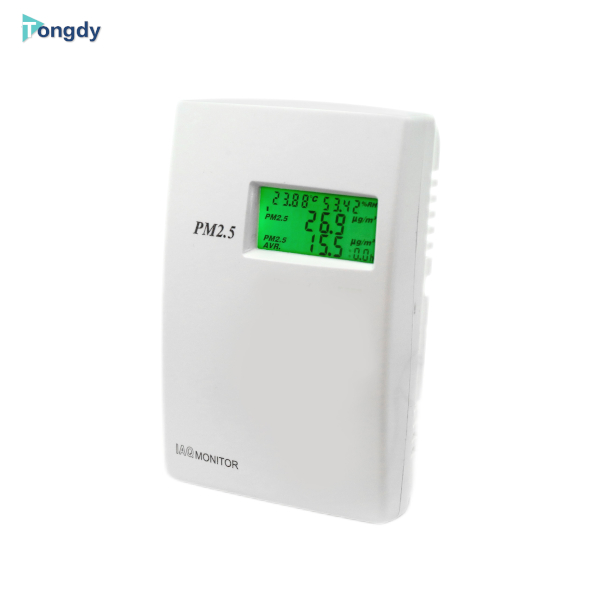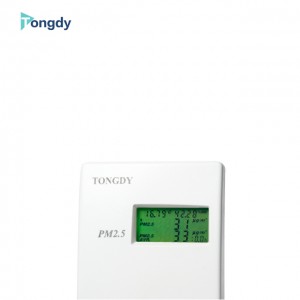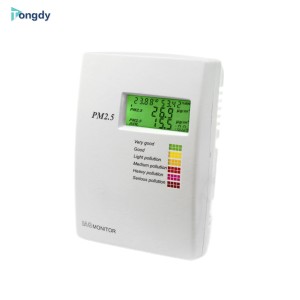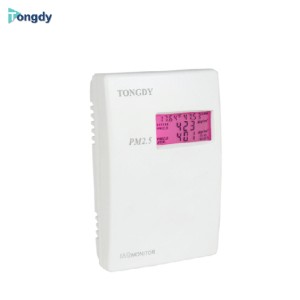Air Particulate Meter
FEATURES
Particulate matter (PM) is a particle pollution, which is produced in a great number of ways that can be classified into either mechanical or chemical processes. Traditionally, the environmental sciences have divided particles into two main groups PM10 and PM2.5.
PM10 is particles between 2.5 and 10 microns (micrometers) in diameter (a human hair is about 60 micron in diameter). PM2.5 is particles smaller than 2.5 microns. PM2.5 and PM10 have different material compositions and can come from different places. The smaller the particle the longer it can remain suspended in the air before settling. PM2.5 can stay in the air from hours to weeks and travel very long distances because it is smaller and lighter.
PM2.5 can get down into the deepest (alveolar) portions of the lungs when gas exchange occurs between the air and your blood stream. These are the most dangerous particles because the alveolar portion of the lungs has no efficient means of removing them and if the particles are water soluble, they can pass into the blood stream within minutes. If they are not water soluble, they remain in the alveolar portion of the lungs for a long time. When the small particles go deeply into the lungs and become trapped this can result in lung disease, emphysema and/or lung cancer in some cases.
The main effects associated with exposure to particulate matter may include: premature mortality, aggravation of respiratory and cardiovascular disease (indicated by increased hospital admissions and emergency room visits, school absences, loss of work days, and restricted activity days) aggravated asthma, acute respiratory symptoms, chronic bronchitis, decreased lung function and increased myocardial infarction.
There are many varieties of particulate pollutants in our homes and offices. Ones from outside include industrial sources, construction sites, combustion sources, pollen, and numerous others. Particles are also generated by all kinds of normal indoor activity ranging from cooking, walking across the carpet, your pets, sofa or beds, air conditioners etc. Any movement or vibration can create airborne particles!
TECHNICAL SPECIFICATIONS
| General Data | |
| Power supply | G03-PM2.5-300H: 5VDC with a power adaptor
G03-PM2.5-340H: 24VAC/VDC |
| Work consumption | 1.2W |
| Warm-up time | 60s (first using or using again after a long-time power off) |
| Monitor parameters | PM2.5, air temperature, air relative humidity |
| LCD display | LCD six backlit, displays six levels of PM2.5 concentrations and one hour moving average value.
Green: Top Quality- Grade I Yellow: Good Quality-Grade II Orange: mild level pollution -Grade III Red: medium level pollution Grade IV Purple: seriously level pollution Grade V Maroon: severe pollution - Grade VI |
| Installation | Desktop-G03-PM2.5-300H
Wall mounting-G03-PM2.5-340H |
| Storage condition | 0℃~60℃/ 5~95%RH |
| Dimensions | 85mm×130mm×36.5mm |
| Housing materials | PC+ABS materials |
| Net weight | 198g |
| IP class | IP30 |
| Temperature and Humidity Parameters | |
| Temperature humidity sensor | Built-in high precision digital integrated temperature humidity sensor |
| Temperature measuring range | -20℃~50℃ |
| Relative humidity measuring range | 0~100%RH |
| Display resolution | Temperature:0.01℃ Humidity:0.01%RH |
| Accuracy | Temperature:<±0.5℃@30℃ Humidity:<±3.0%RH (20%~80%RH) |
| Stability | Temperature:<0.04℃ per year Humidity:<0.5%RH per year |
| PM2.5 Parameters | |
| Built-in sensor | Laser dust sensor |
| Sensor Type | Optical sensing with an IR LED and a photo-sensor |
| Measuring range | 0~600μg∕m3 |
| Display resolution | 0.1μg∕m3 |
| Measuring accuracy(1h average) | ±10µg+10% of reading @ 20℃~35℃,20%~80%RH |
| Working life | >5 years (avoid to close lampblack, dust, great light) |
| Stability | <10% measurement decline in five years |
| Option | |
| RS485 interface | MODBUS protocol,38400bps |





